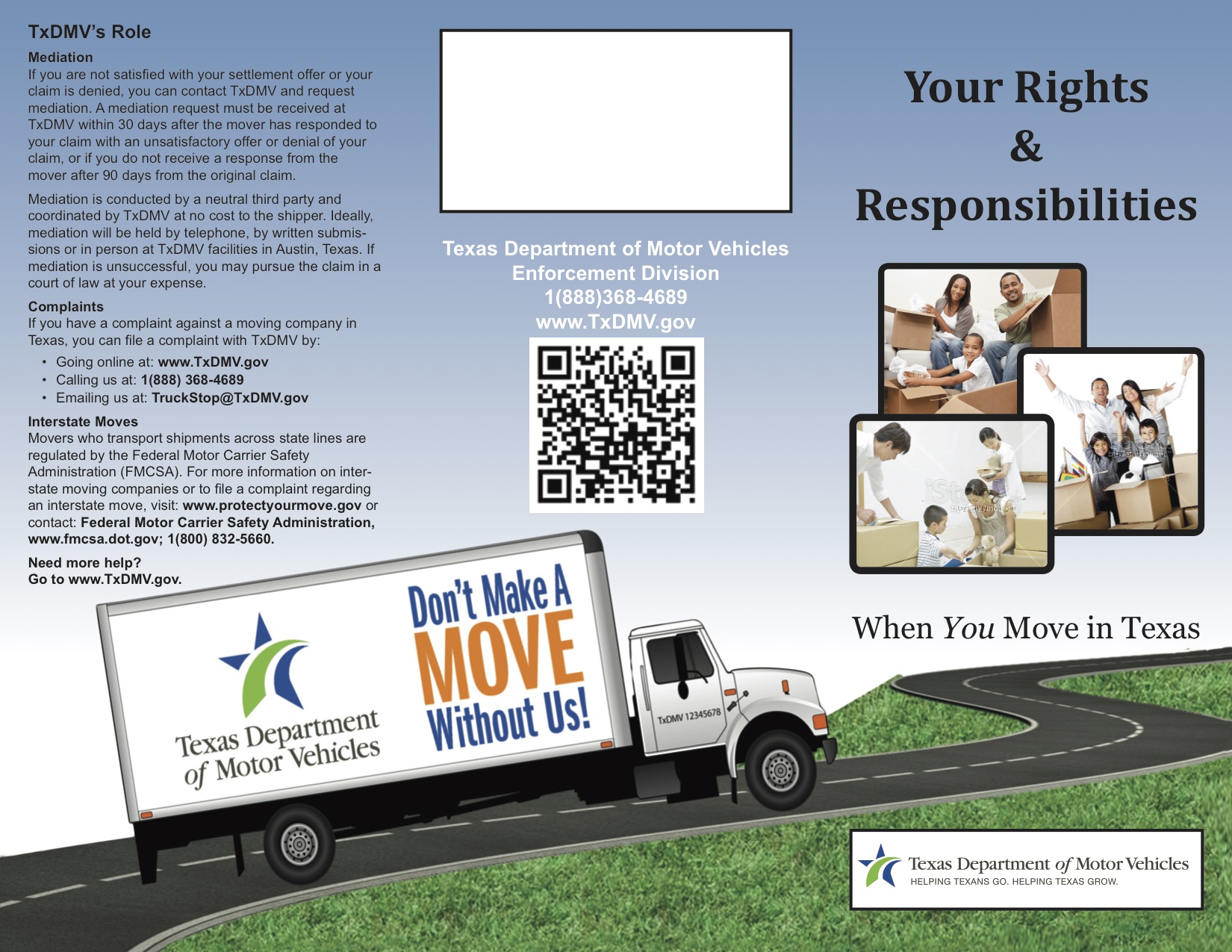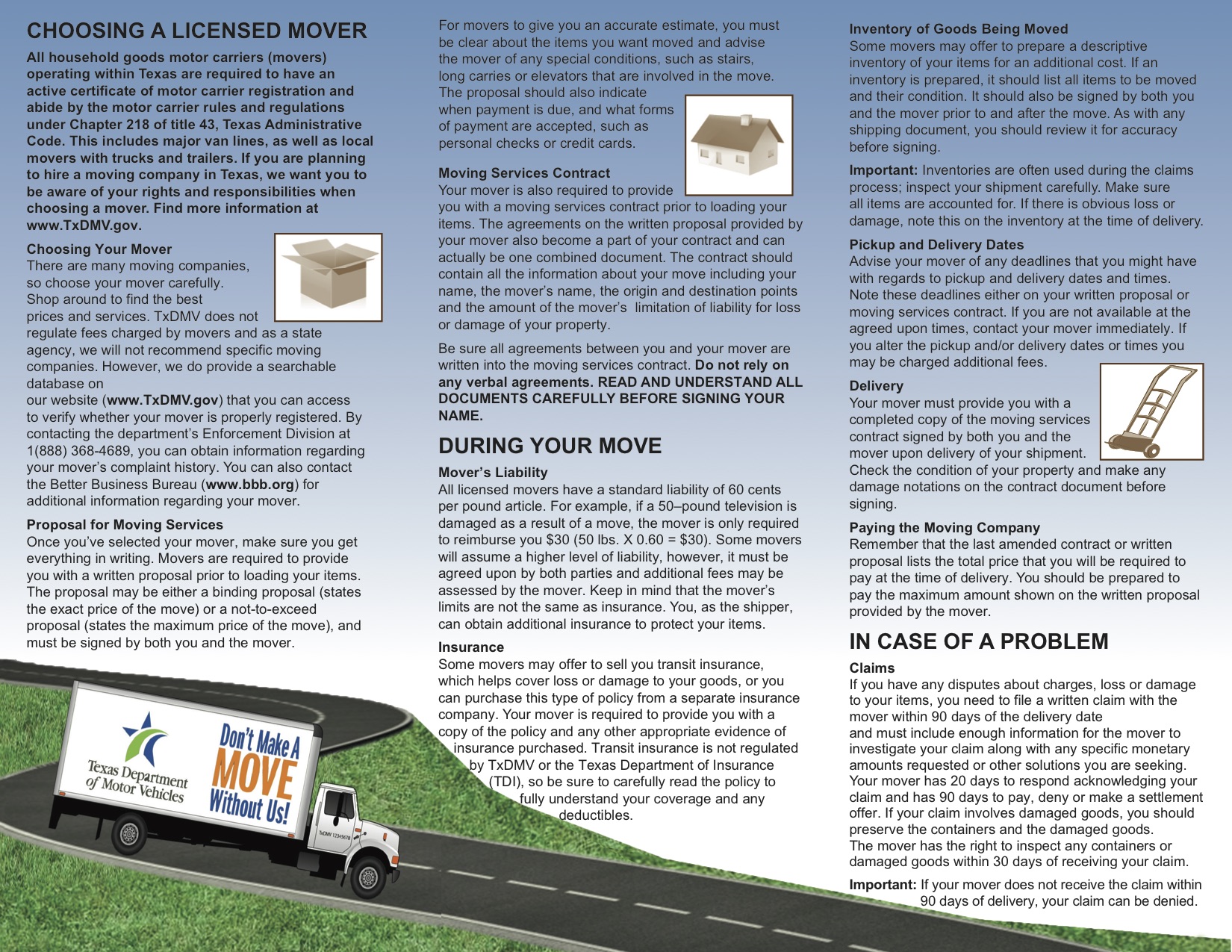Here is a downloadable PDF version:
Wildcat Movers TXDMV Rights and Responsibilties
Here is a transcript of the file:
TXDMV’s Role
Mediation
If you are not satisfied with your settlement offer or your claim is denied, you can contact TxDMV and request mediation. A mediation request must be received at TxDMV within 30 days after the mover has responded to your claim with an unsatisfactory offer or denial of your claim, or if you do not receive a response from the mover after 90 days from the original claim.
Mediation is conducted by a neutral third party and coordinated by TxDMV at no cost to the shipper. Ideally, mediation will be held by telephone, by written submis- sions or in person at TxDMV facilities in Austin, Texas. If mediation is unsuccessful, you may pursue the claim in a court of law at your expense.
Complaints
If you have a complaint against a moving company in Texas, you can file a complaint with TxDMV by:
- Going online at: www.TxDMV.gov
- Calling us at: 1(888) 368-4689
- Emailing us at: TruckStop@TxDMV.gov
Interstate Moves
Movers who transport shipments across state lines are regulated by the Federal Motor Carrier Safety Administration (FMCSA). For more information on inter- state moving companies or to file a complaint regarding an interstate move, visit: www.protectyourmove.gov or contact: Federal Motor Carrier Safety Administration, www.fmcsa.dot.gov; 1(800) 832-5660.
Need more help?
Go to www.TxDMV.gov.CHOOSING A LICENSED MOVER
All household goods motor carriers (movers) operating within Texas are required to have an active certificate of motor carrier registration and abide by the motor carrier rules and regulations under Chapter 218 of title 43, Texas Administrative Code. This includes major van lines, as well as local movers with trucks and trailers. If you are planning to hire a moving company in Texas, we want you to be aware of your rights and responsibilities when choosing a mover. Find more information at www.TxDMV.gov.
Choosing Your Mover
There are many moving companies,
so choose your mover carefully.
Shop around to find the best
prices and services. TxDMV does not
regulate fees charged by movers and as a state agency, we will not recommend specific moving companies. However, we do provide a searchable database onour website (www.TxDMV.gov) that you can access to verify whether your mover is properly registered. By contacting the department’s Enforcement Division at 1(888) 368-4689, you can obtain information regarding your mover’s complaint history. You can also contact the Better Business Bureau (www.bbb.org) for additional information regarding your mover.
Proposal for Moving Services
Once you’ve selected your mover, make sure you get everything in writing. Movers are required to provide you with a written proposal prior to loading your items. The proposal may be either a binding proposal (states the exact price of the move) or a not-to-exceed proposal (states the maximum price of the move), and must be signed by both you and the mover.
For movers to give you an accurate estimate, you must be clear about the items you want moved and advise the mover of any special conditions, such as stairs, long carries or elevators that are involved in the move. The proposal should also indicate
when payment is due, and what forms of payment are accepted, such as personal checks or credit cards.
Moving Services Contract
Your mover is also required to provide
you with a moving services contract prior to loading your items. The agreements on the written proposal provided by your mover also become a part of your contract and can actually be one combined document. The contract should contain all the information about your move including your name, the mover’s name, the origin and destination points and the amount of the mover’s limitation of liability for loss or damage of your property.Be sure all agreements between you and your mover are written into the moving services contract. Do not rely on any verbal agreements. READ AND UNDERSTAND ALL DOCUMENTS CAREFULLY BEFORE SIGNING YOUR NAME.
DURING YOUR MOVE
Mover’s Liability
All licensed movers have a standard liability of 60 cents per pound article. For example, if a 50–pound television is damaged as a result of a move, the mover is only required to reimburse you $30 (50 lbs. X 0.60 = $30). Some movers will assume a higher level of liability, however, it must be agreed upon by both parties and additional fees may be assessed by the mover. Keep in mind that the mover’s limits are not the same as insurance. You, as the shipper, can obtain additional insurance to protect your items.
Insurance
Some movers may offer to sell you transit insurance, which helps cover loss or damage to your goods, or you can purchase this type of policy from a separate insurance company. Your mover is required to provide you with a copy of the policy and any other appropriate evidence of
insurance purchased. Transit insurance is not regulated by TxDMV or the Texas Department of Insurance (TDI), so be sure to carefully read the policy to
fully understand your coverage and any deductibles.
Inventory of Goods Being Moved
Some movers may offer to prepare a descriptive inventory of your items for an additional cost. If an inventory is prepared, it should list all items to be moved and their condition. It should also be signed by both you and the mover prior to and after the move. As with any shipping document, you should review it for accuracy before signing.
Important: Inventories are often used during the claims process; inspect your shipment carefully. Make sure
all items are accounted for. If there is obvious loss or damage, note this on the inventory at the time of delivery.Pickup and Delivery Dates
Advise your mover of any deadlines that you might have with regards to pickup and delivery dates and times. Note these deadlines either on your written proposal or moving services contract. If you are not available at the agreed upon times, contact your mover immediately. If you alter the pickup and/or delivery dates or times you may be charged additional fees.
Delivery
Your mover must provide you with a
completed copy of the moving services
contract signed by both you and the
mover upon delivery of your shipment.
Check the condition of your property and make any damage notations on the contract document before signing.Paying the Moving Company
Remember that the last amended contract or written proposal lists the total price that you will be required to pay at the time of delivery. You should be prepared to pay the maximum amount shown on the written proposal provided by the mover.
IN CASE OF A PROBLEM
Claims
If you have any disputes about charges, loss or damage to your items, you need to file a written claim with the mover within 90 days of the delivery date
and must include enough information for the mover to investigate your claim along with any specific monetary amounts requested or other solutions you are seeking. Your mover has 20 days to respond acknowledging your claim and has 90 days to pay, deny or make a settlement offer. If your claim involves damaged goods, you should preserve the containers and the damaged goods.The mover has the right to inspect any containers or damaged goods within 30 days of receiving your claim.
Important: If your mover does not receive the claim within 90 days of delivery, your claim can be denied.


